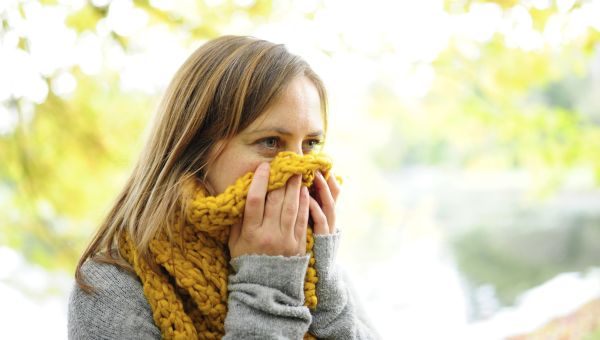6 surprising asthma triggers
Is this the reason you're wheezing?
Updated on September 5, 2024

Hidden Triggers to Avoid
If you have asthma, you may be familiar with triggers that can lead to an asthma attack. Exercising, cigarette smoke, and dust may all pop into mind. But there are other less commonly known causes of asthma attacks.
If you’re not sure why your asthma has been acting up, check this list of surprising triggers to see if one of them may be affecting you. By getting… Show More
If you have asthma, you may be familiar with triggers that can lead to an asthma attack. Exercising, cigarette smoke, and dust may all pop into mind. But there are other less commonly known causes of asthma attacks.
If you’re not sure why your asthma has been acting up, check this list of surprising triggers to see if one of them may be affecting you. By getting to know your triggers, you may be able to help prevent attacks before they even happen.
Show Less
Cockroaches
Some people are allergic to a protein found in cockroaches and their waste. This can worsen asthma symptoms year-round, even when the insects are dead.
Solution: Make your home s iunwelcome to roaches. These bugs are looking for water, food, and a place to nest, so tidy up. Tightly close trash and… Show More
Some people are allergic to a protein found in cockroaches and their waste. This can worsen asthma symptoms year-round, even when the insects are dead.
Solution: Make your home s iunwelcome to roaches. These bugs are looking for water, food, and a place to nest, so tidy up. Tightly close trash and recycle bins. Seal up pet food. Fix leaky pipes, get rid of old boxes and junk mail, and repair any cracks in walls, floors, or ceilings. If you need to kill a cockroach, be sure to use bug traps instead of sprays, which can irritate your breathing even more.
Show Less
Painkillers and antacids
Taking aspirin may help relieve your sore back, but it could hurt your breathing. A fair amount of people with asthma have a sensitivity to aspirin and other non-steroidal anti-inflammatory drugs (NSAIDs) like ibuprofen that can lead to severe attacks. Your healthcare provider (HCP) may ask you to… Show More
Taking aspirin may help relieve your sore back, but it could hurt your breathing. A fair amount of people with asthma have a sensitivity to aspirin and other non-steroidal anti-inflammatory drugs (NSAIDs) like ibuprofen that can lead to severe attacks. Your healthcare provider (HCP) may ask you to avoid aspirin, even if you're not sure it's a trigger for you. Watch out for hidden sources of aspirin, like Alka-Seltzer. Ibuprofen and other anti-inflammatory drugs can also irritate your asthma.
Solution: Tylenol is asthma-safe, but talk to your HCP to get the right pill recommendation for your needs. For chronic pain, consider drug-free solutions, such as yoga or meditation.
Show Less
Air pollution
Air pollution is a common trigger for asthma. It can make your symptoms worse, and in most situations, it can be unavoidable. Big, bustling cities have more smog—made of very small particles and ozone. Driving with your windows down could fill your lungs with more of these irritants that can worsen… Show More
Air pollution is a common trigger for asthma. It can make your symptoms worse, and in most situations, it can be unavoidable. Big, bustling cities have more smog—made of very small particles and ozone. Driving with your windows down could fill your lungs with more of these irritants that can worsen your asthma.
Solution: Tune into your local news station for the weather or visit airnow.gov for daily air quality index reports. It could be risky for you to go outside when there's high pollution (orange or red days). On those days, stay in well-ventilated, air-conditioned buildings and try not to exercise outside.
Show Less
Stress
Feeling overwhelmed can send you on the straight path toward an asthma attack. It may not matter what you're feeling anxious about. Even lower levels of stress can lead to an asthma exacerbation, shortness of breath, and the need for your rescue inhaler.
Solution: Stress is a natural part… Show More
Feeling overwhelmed can send you on the straight path toward an asthma attack. It may not matter what you're feeling anxious about. Even lower levels of stress can lead to an asthma exacerbation, shortness of breath, and the need for your rescue inhaler.
Solution: Stress is a natural part of life. But finding ways to calm down mentally may help you feel better physically. When you're feeling especially worried, start with taking a deep breath. Make sure you have a friend, loved one, or professional to talk to about your feelings. Your mind and body will also be more at peace if you get plenty of sleep, exercise, and avoid junk food.
Show Less
Weather
Cold, dry air can irritate your airways, and it can sometimes prompt an asthma attack. Thunderstorms can also trigger asthma attacks if they happen at the same time as a period of high humidity and pollen. In fact, almost any weather extreme, even high heat, can worsen asthma symptoms.
Cold, dry air can irritate your airways, and it can sometimes prompt an asthma attack. Thunderstorms can also trigger asthma attacks if they happen at the same time as a period of high humidity and pollen. In fact, almost any weather extreme, even high heat, can worsen asthma symptoms.
Solution: If you have to be outside in dry cold, protect your nose and mouth by covering them. Wearing a face mask can help keep away the chill and make breathing a little easier. It's especially important to wear a mask if you're exercising outside, like during your morning walk. And during any extreme weather, choose indoor activities whenever possible.
Show Less
Food with sulfites
Sulfites are chemical compounds that can occur naturally in some foods but are mostly used as additives to keep processed foods fresh. They're sometimes a problem for people with asthma because they can irritate the lungs, triggering wheezing and coughing.
Solution: Avoid fermented products, like… Show More
Sulfites are chemical compounds that can occur naturally in some foods but are mostly used as additives to keep processed foods fresh. They're sometimes a problem for people with asthma because they can irritate the lungs, triggering wheezing and coughing.
Solution: Avoid fermented products, like beer, wine, and vinegar. Also, preserved foods—including pickles, dried fruit, and even pre-packaged guacamole—often contain sulfites. Some processed meats and frozen seafood may also contain them. Cooking meals at home using fresh ingredients is the best way to avoid this trigger.
Show Less
Environmental chemicals
Potential asthma triggers may hide in many products you use at home and the materials you encounter at work. These include volatile organic compounds (VOCs), which can emanate from new furniture, cabinets, rugs, and floors, and from products like solvents, paints, pesticides (including mothballs),… Show More
Potential asthma triggers may hide in many products you use at home and the materials you encounter at work. These include volatile organic compounds (VOCs), which can emanate from new furniture, cabinets, rugs, and floors, and from products like solvents, paints, pesticides (including mothballs), and even personal care products. At work, you can find them lurking in many more places, including building materials, copiers and printers, white-out fluids, copy paper, glues, and permanent markers.
Solution: Make sure your home and work environments have excellent ventilation, and store all products that contain VOCs in a place outside of the living space and workspace. Even better, if you must buy products that emit VOCs, only buy what you need, so that you don’t have to store the excess.
Show Less
United States Environmental Protection Agency. Asthma Triggers: Gain Control. Page last updated April 3, 2024.
American Academy of Allergy, Asthma and Immunology. Asthma Triggers and Management. Page last reviewed November 7, 2023.
Asthma and Allergy Foundation of America. Asthma Triggers: Air Pollution. Page accessed September 5, 2024.
Cleveland Clinic. Stress & Asthma. Page last reviewed January 7, 2021.
Asthma and Allergy Foundation of America. Asthma Triggers: Weather. Page last updated April 2024.
Asthma and Allergy Foundation of America. Cold Weather Advisory: People with Asthma Should Take Precautions to Prevent Symptoms. Page accessed September 5, 2024.
Cleveland Clinic. Sulfite Sensitivity. Page last reviewed April 24, 2024.
Mattila T, Santonen T, Andersen HR, et al. Scoping Review-The Association between Asthma and Environmental Chemicals. Int J Environ Res Public Health. 2021 Feb 1;18(3):1323.
Paterson C, Sharpe R, Taylor T, et al. Indoor PM2.5, VOCs and asthma outcomes: A systematic review in adults and their home environments. Environmental Research. 2021;202:111631.
United States Environmental Protection Agency. Volatile Organic Compounds' Impact on Indoor Air Quality. Page last updated August 15, 2023.
More On


video

slideshow


video


video
